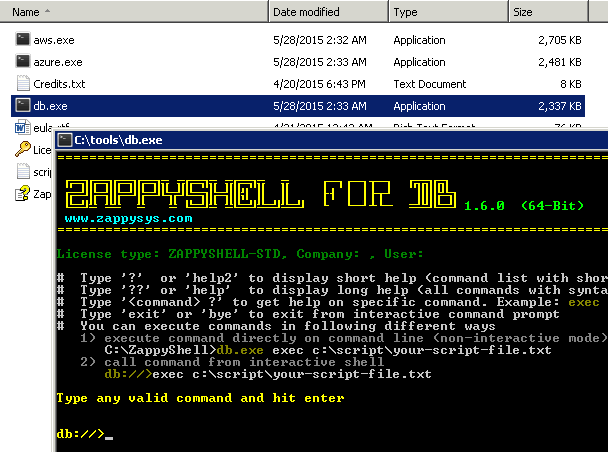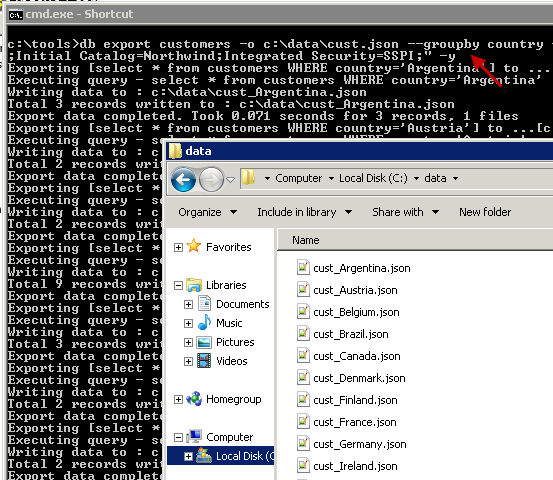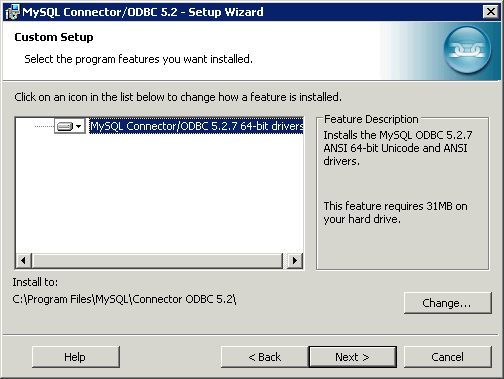Introduction
In this article we will learn how to use ZappyShell Command Line Tools for MySQL JSON Export from Table or Query result
JSON File format is becoming very popular due to its simplicity and smaller size. Most of NoSQL Databases are now using JSON for their document mechanism.
The problem
Solution
Download and Install MySQL ODBC Driver
To export data from MySQL we will need ODBC Driver. In this tutorial we have use MySQL ODBC 5.2 Driver but if you are using different driver then change connection string accordingly.
Download and Install MySQL ODBC Driver from below URL
http://dev.mysql.com/downloads/connector/odbc/
Download and Install ZappyShell Command Line Tools
Now next step is we need to Download and Install ZappyShell Command Line tools from hereYou can Download MSI Installer or XCopy Zip file which you can simply extract and copy (see below).

ZappyShell Command Line Tools – Export JSON, Excel, CSV, PDF
MySQL JSON Export – Single table
c:\tools>db.exe export customers --out c:\data\customers..json --json --overwrite --connstr "Driver={MySQL ODBC 5.2 ANSI Driver};Server=your_server_name_or_ip;Port=3306;Uid=user1;pwd=SomeP@ssword;Database=your_db_name"MySQL JSON Export – Multiple tables
c:\tools>db.exe export customers|orders|products --out c:\data\customers..json --json --overwrite --connstr "Driver={MySQL ODBC 5.2 ANSI Driver};Server=your_server_name_or_ip;Port=3306;Uid=user1;pwd=SomeP@ssword;Database=your_db_name"MySQL JSON Export – Multiple tables (using pattern)
c:\tools>db.exe export cust% --schema Sales --out c:\data\customers..json --json --overwrite --connstr "Driver={MySQL ODBC 5.2 ANSI Driver};Server=your_server_name_or_ip;Port=3306;Uid=user1;pwd=SomeP@ssword;Database=your_db_name"MySQL JSON Export – SQL Query
c:\tools>db.exe export "select * from customers where country like 'US%'" --out c:\data\customers.json --json --overwrite --connstr "Driver={MySQL ODBC 5.2 ANSI Driver};Server=your_server_name_or_ip;Port=3306;Uid=user1;pwd=SomeP@ssword;Database=your_db_name"Using Map File for nested MySQL JSON Export
Lets say you want to export customer data along with orders they placed as nested JSON document then we have to supply Map file so JSON Generator can figure out how to JOIN two datasets and how to Shape JSON. In below example we are doing 3 nested levels for demo purpose. Customer joined with Orders by CustomerID key, Orders Joined with Employee by EmployeeID key.
MySampleMap.xml
<?xml version="1.0" encoding="UTF-8"?>
<settings ver="1">
<dataset id="cust" main="true">select * from Customers</dataset>
<dataset id="ord">select * from Orders</dataset>
<dataset id="emp">select * from Employees</dataset>
<join parentid="cust" childid="ord" keys="CustomerID" />
<join parentid="ord" childid="emp" keys="EmployeeID" />
<map src="CustomerID" name="ID" />
<map src="CompanyName" />
<map name="Contact">
<map src="Phone" />
<map src="Fax" />
<map name="Location">
<map src="Country" />
<map src="Region" />
</map>
</map>
<map name="OrderIDList" dataset="ord" maptype="valuearray" src="OrderID"/>
<map name="Orders" dataset="ord">
<map src="OrderID" />
<map src="OrderDate" />
<map name="EmpInfo" dataset="emp">
<map src="EmployeeID" />
<map src="FirstName" />
</map>
</map>
</settings>
c:\tools>db.exe export --map c:\MySampleMap.xml --out c:\data\customers.json --connstr "Driver={MySQL ODBC 5.2 ANSI Driver};Server=your_server_name_or_ip;Port=3306;Uid=user1;pwd=SomeP@ssword;Database=your_db_name"
customers.json : Output JSON generated from above Command
[
{
"ID": "ALFKI",
"CompanyName": "Alfreds Futterkiste",
"Contact": {
"Phone": "030-0074321",
"Fax": "030-0076545",
"Location": {
"Country": "Germany",
"Region": null
}
},
"OrderIDList": [10643,10692],
"Orders": [
{
"OrderID": 10643,
"OrderDate": "1997-08-25",
"EmpInfo": [
{
"EmployeeID": 6,
"FirstName": "Michael"
}
]
},
{
"OrderID": 10702,
"OrderDate": "1997-10-13",
"EmpInfo": [
{
"EmployeeID": 4,
"FirstName": "Margaret"
}
]
}
]
},
{
"ID": "ANATR",
"CompanyName": "Ana Trujillo Emparedados y helados",
"Contact": {
"Phone": "(5) 555-4729",
"Fax": "(5) 555-3745",
"Location": {
"Country": "Mexico",
"Region": null
}
},
"OrderIDList": [10308,10625,10759,10926],
"Orders": [
{
"OrderID": 10308,
"OrderDate": "1996-09-18",
"EmpInfo": [
{
"EmployeeID": 7,
"FirstName": "Robert"
}
]
},
{
"OrderID": 10625,
"OrderDate": "1997-08-08",
"EmpInfo": [
{
"EmployeeID": 3,
"FirstName": "Janet"
}
]
}
]
}
]
MySQL JSON Export – Split Files
Sometimes you may have need to split large amount of data into multiple files. With ZappyShell command line you can split data three different ways. Lets check each example.
MySQL JSON Export – Split By Row Count
In below example we are exporting MySQL customer table to JSON files and splitting files with maximum 1000 records per file option.
c:\tools>db.exe export customers --out c:\data\cust.json --split --splitrows 1000 --connstr "Driver={MySQL ODBC 5.2 ANSI Driver};Server=your_server_name_or_ip;Port=3306;Uid=user1;pwd=SomeP@ssword;Database=your_db_name"
MySQL JSON Export – Split Files By File Size
In below example we are exporting MySQL customer table to JSON files and splitting files with maximum file size = 10MB option. You also use other size specifier like KB, GB, BYTES etc.
c:\tools>db.exe export customers --out c:\data\cust.json --split --splitsize 10MB --connstr "Driver={MySQL ODBC 5.2 ANSI Driver};Server=your_server_name_or_ip;Port=3306;Uid=user1;pwd=SomeP@ssword;Database=your_db_name"
MySQL JSON Export – Split Files By Group By Column
In this example we have exported customers in to separate file by country.
c:\tools>db.exe export customers --out c:\data\cust.json --groupby Country --connstr "Driver={MySQL ODBC 5.2 ANSI Driver};Server=your_server_name_or_ip;Port=3306;Uid=user1;pwd=SomeP@ssword;Database=your_db_name"

ZappyShell – Export MySQL Table to JSON, Split files by Country Column
MySQL JSON Export – Compressed files
If you want to output compressed JSON (GZIP format) then use below command.
c:\tools>db.exe export customers --out c:\data\cust.json --gzip --connstr "Driver={MySQL ODBC 5.2 ANSI Driver};Server=your_server_name_or_ip;Port=3306;Uid=user1;pwd=SomeP@ssword;Database=your_db_name"
Using date time place holders in JSON file name
If you want to use date time place holders in file name so it automatically uses specified date time parts use below command simply putting specifiers in file name anywhere.
c:\tools>db.exe export customers --out c:\data\cust_{{YYYY}}_{{MM}}_{{DD}}_{{HH24}}_{{MI}}_{{SS}}.json --connstr "Driver={MySQL ODBC 5.2 ANSI Driver};Server=your_server_name_or_ip;Port=3306;Uid=user1;pwd=SomeP@ssword;Database=your_db_name"
MySQL JSON Export – Multi Content format
c:\tools>db.exe export customers --out c:\data\cust.json --json-multi-content --connstr "Driver={MySQL ODBC 5.2 ANSI Driver};Server=your_server_name_or_ip;Port=3306;Uid=user1;pwd=SomeP@ssword;Database=your_db_name"


